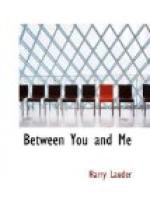We’ve seen strikes on a’ sides, and in a’ lands. In Britain and in America I’ve seen them.
I deplore a strike. And that’s because a strike is like a war, and there’s no need for either. One side can force a war—as the Hun did. But if the Hun had been a reasonable, decent body—and I’m praying we’ve taught him, all we Allies, that he maun become such if he’s tae be allowed tae go on living in the world at a’!—he could ha’ found the rest o’ the world ready to talk ower things wi’ him.
And when it comes tae a strike need ane side or the other act like the Hun? Is it no always sae that i’ the end a strike is settled, wi’ both sides giving in something to the other? How often maun one or the other be beaten flat and crushed? Seldom, indeed. Then why canna we get together i’ the beginning, and avoid the bitterness, and the cost of the struggle?
The thing we’ve a’ seen maist often i’ the war was the fineness of humanity. Men who hadna seemed tae be o’ much account proved themselves true i’ the great test. It turned oot, when the strain was put upon them, that maist men were fine and brave and full of the spirit of self sacrifice. Men learned that i’ the trenches. Women proved it at hame. It was one for a’, and a’ for one.
Shall we drop a’ that noo that peace has come again? Shall we gie up a’ we ha’ learned of how men of different minds can pull together for a common end? I’m thinking we’ll no be such fools. We had to pull together i’ the war to keep frae being destroyed. But noo we’ve a chance to get something positive—to mak’ something profitable and worth while oot of pulling together. Before it was just a negative thing that made us do it. It was fear, in a way. It was the threat that the Hun made against all we held most dear and sacred.
Noo it’s sae different. We worked miracles i’ the war. We did things the world had thought impossible. They’ve aye said that it was necessity that was the mither of invention, and the war helped again tae prove hoo true a saying that was. Weel, canna we make the necessity for a better world the mother of new and greater inventions than any we ha’ yet seen? Can we no accomplish miracles still, e’en though the desperate need for them has passed?
That’s the thing I think of maist these days—that it would be a sair thing and a tragic thing if the spirit that filled the world during the war should falter the noo. We’ve suffered sae much—we’ve given sae much of our best. We maun gain a’ that we can in return. And the way has been pointed tae us. It is but for us to follow it.
Things have aye been done in certain ways. Weel, they seemed ways gude enow. But when the war came we found they were no gude enow, for all we’d thocht. And because it was a case of must, we changed them. There’s many would gae back. They say that wi’ the end o’ the war there maun be an end o’ all the changes that it brought. But we could do more, we could accomplish more, through those changes. I say it would be a foolish thing and a wicked thing to go back.




